Well, as you know, Clint's not intimidating in any way. She began to like him very much as the days went on. Then, very, very much, etcetera. When we got to the love scene, they had already found their way together. At the end of the picture she came over to me and said, 'Anytime you do a picture with Clint and there's a part in it, call me.'Cattle driver Jed Cooper (Clint Eastwood) survives a lynching by a mob that wrongly pins a crime on him. Cooper unknowingly purchased his cattle from a thief, but the group accuses him of being the thief and a murderer. The men steal his saddle and money before hanging him from a tree.
Cooper survives this incident and is cleared of any wrongdoing by Judge Fenton (Pat Hinkle) who then offers Cooper a job as a marshal. The film focuses on Cooper's work as a marshal as well as his hunt for the lynch mob that attempted to murder him.
Inger Stevens plays storeowner and widow Rachel Warren. Rachel first locks eyes with Cooper when she peers into a tumbleweed wagon full of prisoners. He has not yet been deemed innocent by Judge Fenton at this point.
Rachel takes her time silently circling the wagon, closely examining each man's face. It is clear that the man she hunts is not inside.
When we see her next, Rachel is again inspecting prisoners. The judge and officers allow Rachel to inspect all new prisoners, because she is desperately seeking the men who wronged her.
Rachel is let down and it is obvious she's been following this routine of wary hope for quite a long time. Cooper suggests that her behavior is strange and Rachel immediately takes offense. She responds, "We all have our ghosts, Marshal. You hunt your way and I’ll hunt mine."
During a public lynching of the actual rustlers, Cooper visits the local brothel and is there ambushed by some members of the mob. Rachel insists on going to the brothel to care for Cooper herself. She tends to his wounds and stands guard from a chair by the bed.
The madam warns Rachel that she is growing too attached to the marshal, by saying "...but one of these days he's gonna get better. Then you'll have a man on your hands."
Rachel is undeterred. She nurses Cooper back to health and takes the weak marshal on a picnic. He kisses her several times and she asks him to stop and then shares her story. Rachel was married to a doctor. They relocated from Denver because her husband wanted to go where doctors were most needed. As they sat by a fire at their camp, Rachel and her husband were approached by men who asked for food. The men then shot her husband and raped Rachel, as she says in a heart-rending speech, "they took me...and took me...and took me."
Cooper asks what Rachel will do if she never finds her attackers in the prison wagons or cells and she cannot answer. Since that awful event, Rachel's been consumed with bringing the men to justice.
The picnic is interrupted by a violent rainstorm so Rachel and an unwell Cooper seek shelter in a nearby shed. Rachel covers him with a blanket and flour sack, rubs his back and arms to combat his shivering, and finally lies down and holds him close to her.
When he awakes, Cooper gently kisses Rachel and they make love.
Time moves on. Rachel sees Marshal Cooper and meets him outside her store. She looks at him with eyes full of longing and hope for the future. Rachel says that since she met him she knows that she can let go of her ghosts and embrace life again. Cooper tells her that he doesn't know what comes next for him and rides off as the film ends. It's a bittersweet and appropriate ending for a western about a loner lawman, but I still yearned for him to invite sweet, dedicated Rachel to share his saddle and ride off into the sunset together.
Inger's performance in the role is often quiet but intense. As she does in so many of her performances, Inger says so much about her character in her eyes alone. Inger would've made a fantastic actress in silent films as well. She doesn't need words to convey her character's feelings or motivations, but when Inger delivers her lines it is slowly, thoughtfully. Each word and the pause before and after are meaningful.
Source:
Schickel, Richard. Clint Eastwood: A Biography. Vintage Books, 1997.







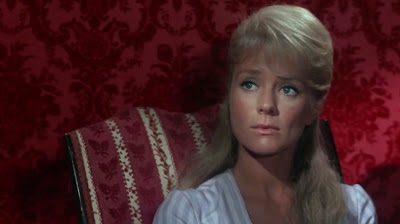
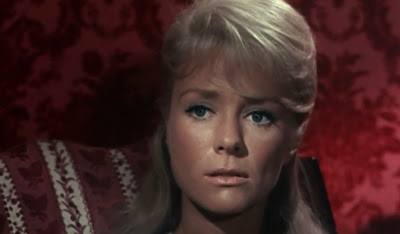

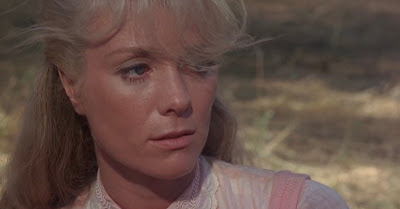
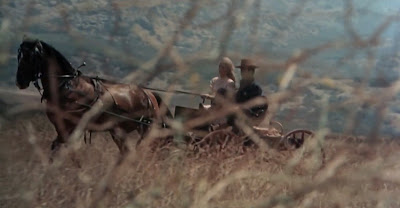
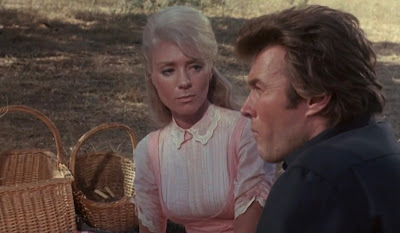

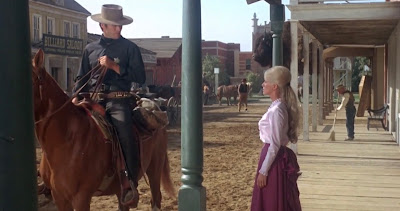

No comments:
Post a Comment